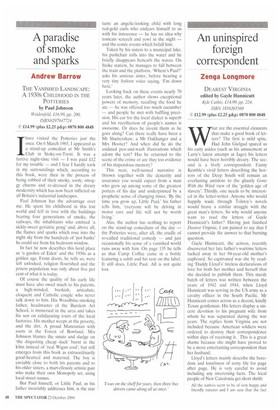A paradise of smoke and sparks
Andrew Barrow
THE VANISHED LANDSCAPE: A 1930s CHILDHOOD IN THE POTTERIES by Paul Johnson Weidenfeld, £16.99, pp. 200, IS8N0297847724 rt £14.99 (plus £2.25 p&p) 0870 800 4848 Ihave visited the Potteries just the once. On 6 March 1965, I appeared as a stand-up comedian at Mr Smith's Club in Stoke-on-Trent. It was a furtive night-time visit — I was paid £12 for my trouble — and I fear I hardly took in my surroundings which, according to this book, were then in the process of being robbed of their smoky, sooty, smoggy charms and re-dressed in the dreary modernity which has now been inflicted on all Britain's industrial landscapes.
Paul Johnson has the advantage over me. He spent his childhood in this lost world and fell in love with the buildings bearing four generations of smoke, the railways, the inhabitants who emitted 'a sickly-sweet geriatric pong' and, above all, the flames and sparks which rose into the night sky from the hundreds of 'pot banks' he could see from his bedroom window.
In fact he now describes this lurid place as 'a garden of Eden' and the 1930s as a golden age. Front doors, he tells us, were left unlocked, religion flourished and the prison population was only about five per cent of what it is today.
Of course the quality of his early life must have also owed much to his parents, a high-minded, bookish, articulate, eloquent and Catholic couple who never talk down to him. His Woodbine-smoking father, headmaster of the Burslem Art School, is immersed in the area and takes his son on exhilarating tours of the local factories. His mother weeps at the poverty, and the dirt. A proud Mancunian with roots in the Forest of Bowland, Mrs Johnson blames the smuts and sludge on 'the disgusting cheap slack' burnt in the kilns instead of 'real Wigan coal', but still emerges from this book as extraordinarily good-hearted and maternal. The boy is enviably close to both his parents and to his older sisters, a marvellously artistic pair who make their own Monopoly set, using local street names.
But Paul himself, or Little Paul, as his father invariably addresses him, is the star turn: an angelic-looking child with long red-gold curls who endears himself to us with his innocence — he has no idea why tomcats screech and yowl in the night — and the comic events which befall him.
Taken by his sisters to a municipal lake, his pushchair rolls into the water and he briefly disappears beneath the waves. On Stoke station, he manages to fall between the train and the platform. 'Where's Paul?' asks his anxious sister, before hearing a very tiny forlorn voice saying, 'I'm down here.'
Looking back on these events nearly 70 years later, the author shows exceptional powers of memory, recalling the food he ate — he was offered too much cucumber — and people he met with baffling precision. His ear for the local dialect is superb and his recollection of people's names is awesome. Or does he invent them as he goes along? Can there really have been a Mr Shuttershaw, a Mr Oakhanger and a Mrs Hooter? And when did he do the undated pen-and-wash illustrations which adorn the text? Has he returned to the scene of the crime or are they too evidence of his stupendous memory?
This neat, well-turned narrative is thrown together with the dexterity and assurance you would expect from a man who grew up among some of the greatest potters of his day and underpinned by a prophetic sense of changing times. 'By the time you grow up, Little Paul,' his father tells him, 'everyone will be driving in motor cars and life will not be worth living.'
Alas, the author has nothing to report on the stand-up comedians of the day — the Potteries were, after all, the cradle of so-called traditional comedy — and just occasionally his sense of a vanished world runs away with him. On page 135 he tells us that Camp Coffee came in a bottle featuring a sahib and his tent on the label. It still does, Little Paul. All is not quite lost.
























































































 Previous page
Previous page